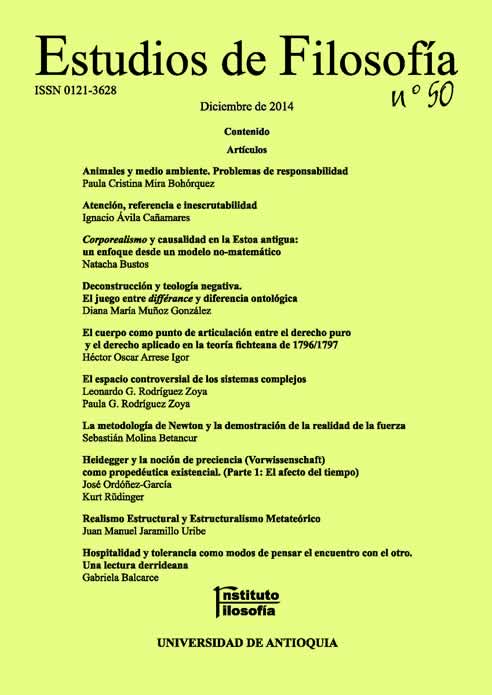Heidegger and the notion of prescience (Vorwissenschaft) as existential propaedeutic. (Part 1: The affection of the time)
DOI:
https://doi.org/10.17533/udea.ef.21143Keywords:
Heidegger, phenomenology, existence, time, prescienceAbstract
This article deals with Heidegger’s notion of “prescience” (Vorwissenschaft), since it addresses knowing and thinking, and the incidence of existing features in their activities. First of all there is existence, which is the condition of possibility for any discipline. Time, which determines existence, will become the radical phenomenon that defines human being as Dasein. This is the term given to the subject of “prescience” and that we will translate as Extar, because we believe that this is the best way to understand thinking as characterized by finitude. Methodology. We have developed this work through a hermeneutic analysis of a genealogical nature based on the deployment of beingness. Results and conclusions. Time is not a scientific subject but a pre-scientific one and so it is a topic that concerns ontology rather than science. Not a physical phenomenon but an affective phenomenon.
Downloads
References
COLLI, G. (1994) El nacimiento de la Filosofía. Barcelona, Tusquets.
ESCUDERO, J. A. (2009) El lenguaje de Heidegger. Diccionario filosófico 1912-1927. Barcelona, Herder.
FREUD, S. (2001) “El yo y el ello”. En: Obras Completas (vol. 7). Madrid, Biblioteca Nueva.
GONZÁLEZ, J. (2008) Heidegger y los relojes. Madrid, Encuentro.
HEIDEGGER, G. (2005) Mein liebes Seelchen! Briefe Martin Heideggers an seine Frau Elfride 1915-1970.
Heidegger, G. (2012) Alma mía. Santiago de Chile: Manantial). München, Deutsche Verlags-Anstalt.
HEIDEGGER, M. (1962) “Die Frage nach der Technik”. En: Die Technik und die Kehre. Pfullingen, Günther Neske, pp. 5-36.
____________ (1984) Was ist das - Die Philosophie? Pfullingen, Günther Neske.
____________ (1988) “Das Ende der Philosophie und die Aufgabe des Denkens”. En: Zur Sache des Denkens. Tübingen, Max Niemeyer, pp. 61-80.
____________ (2004) “Der Begriff der Zeit (Vortrag 1924)”. En: Gesamtausgabe (Band 64). Frankfurt a.m., Vittorio Klostermann, pp. 105-125.
LACAN, J. (2001) “La instancia de la letra en el inconsciente o la razón desde Freud”. En: Escritos 1. México, Siglo XXI, pp. 473-512.
____________ (2002) “La ciencia y la verdad”. En: Escritos 2. Buenos Aires, Siglo XXI, pp. 834-856.
SAFRANSKI, R. (1997) Un maestro de Alemania. M. Heidegger y su tiempo. Barcelona, Tusquets.
Published
How to Cite
Issue
Section
Categories
License
Copyright (c) 2014 José Ordóñez García, Kurt Rüdinger

This work is licensed under a Creative Commons Attribution-NonCommercial-ShareAlike 4.0 International License.
Authors who publish with this journal agree to the following terms:
1. The Author retains copyright in the Work, where the term "Work" shall include all digital objects that may result in subsequent electronic publication or distribution.
2. Upon acceptance of the Work, the author shall grant to the Publisher the right of first publication of the Work.
3. The Author shall grant to the Publisher a nonexclusive perpetual right and license to publish, archive, and make accessible the Work in whole or in part in all forms of media now or hereafter known under a Creative Commons Attribution-NoCommercia-ShareAlike (CC BY-NC-SA 4.0), or its equivalent, which, for the avoidance of doubt, allows others to copy, distribute, and transmit the Work under the following conditions: (a) Attribution: Other users must attribute the Work in the manner specified by the author as indicated on the journal Web site;(b) Noncommercial: Other users (including Publisher) may not use this Work for commercial purposes;
4. The Author is able to enter into separate, additional contractual arrangements for the nonexclusive distribution of the journal's published version of the Work (e.g., post it to an institutional repository or publish it in a book), as long as there is provided in the document an acknowledgement of its initial publication in this journal;
5. Authors are permitted, and Estudios de Filosofía promotes, to post online the preprint manuscript of the Work in institutional repositories or on their Websites prior to and during the submission process, as it can lead to productive exchanges, as well as earlier and greater citation of published work (see The Effect of Open Access). Any such posting made before acceptance and publication of the Work is expected be updated upon publication to include a reference to the Estudios de Filosofía's assigned URL to the Article and its final published version in Estudios de Filosofía.















